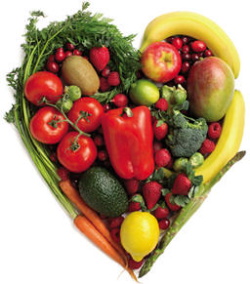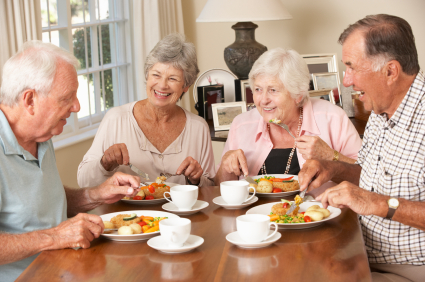
Benefits of Eating Healthy 50+
Nutritional Dietary Guidelines for Older Adults
 Nutritional Recipe Ideas for Older Adults
Nutritional Recipe Ideas for Older Adults
Healthy Eating As We Age - As we age, healthy eating can make a difference in our health, help to improve how we feel, and encourage a sense of well-being. Eating healthy has benefits that can help older adults. Your diet can make a world of difference in how healthy you feel as you age. While some aspects of healthy eating look similar at any age, your body's needs change as you age.
Here are a few dietary guidelines to follow that will serve you well as you get older. Recipe Ideas
Nutritional and dietary Guidelines for Older Adults
How many calories do adults over 50 need? Use the following as a guideline:
A woman over 50 who is:
- Not physically active needs about 1600 calories a day
- Somewhat physically active needs about 1800 calories a day
- Very active needs about 2000 calories a day
A man over 50 who is:
- Not physically active needs about 2000 calories a day
- Somewhat physically active needs about 2200-2400 calories a day
- Very active needs about 2400-2800 calories a day
How to Eat Healthy After Age 50
Fruits and vegetables. As you age, you can't get enough antioxidants and vitamins. A simple way to remember which fruits and veggies to eat is to choose the ones with the brightest colors. Bright reds, greens, yellows, oranges-all of these foods are packed with vitamins and nutrients.
Senior Meal Services: Understanding Your Options
Lots of
dairy. As people age, their bones lose
density-so it's important to get enough calcium and Vitamin D.
It's especially important for the elderly to increase dairy
intake, because as you get older, your body has a harder time
making Vitamin D through sun exposure alone. Three eight-ounce
glasses of milk can provide almost all of your daily recommended
dose of calcium. Nonfat or low-fat dairy items are best,
including yoghurt, cheese, and milk.
Whole
grains. These are full of B vitamins and fiber,
and are an essential part of a healthy diet. Whole wheat breads
and oatmeal are great, as well as quinoa. Avoid white breads,
white pastas, and other refined carbs, however-these are much
less beneficial to your health. When you eat carbs, choose brown
carbs instead of white.
Lean protein. Fad diets such as the Atkins diet promoted high-fat meats, but these can be detrimental to your heart and cardiovascular health as you age. Switch to lean meats and avoid cuts of meat with layers of fat. Fish, beans, legumes, nuts, and poultry are also great choices for leaner protein. Avoid over-eating meat-look for a cut of meat that's about the size of a deck of playing cards.
Fish. Fish can be a great source of Omega 3 fatty acids, which are great for you. Salmon, mackerel, and tuna are usually the best choice, but don't eat too much-approximately two servings per week are generally enough.
Spices rather than salt. Salt makes your body retain water, which can increase your blood pressure-something that can cause heart attacks, strokes, and heart failure. A high salt intake has also been linked to kidney stones and kidney disease, osteoporosis, vascular dementia, and other health problems. Rather than using salt to boost flavor, consider using spices and herbs.
Unsaturated rather than saturated fats. The easy rule of thumb is that if a fat is solid, don't eat it. If it's solid at room temperature outside your body, it will also be solid inside your body-including in your veins and arteries. Instead of butter, choose olive oil and other oils for cooking. Avoid meat with layers of solid fat. Make foods such as bacon a once-in-a-while treat rather than a breakfast staple.
Healthy eating is important at any age, but becomes particularly crucial as you age. Choose colorful fruits and vegetables, unsaturated rather than saturated fats, spices rather than salt, and get plenty of dairy and whole grains. Talk to your doctor for dietary guidelines specific to your health situation, and you should be able to put together a dietary plan that will keep you feeling great.
Related Healthy Aging Articles:
- The Benefits of Massage Therapy for Seniors
- Common Health Issues Among Elderly
- Hobbies That Offer Health Benefits for Seniors
- After Retirement, What's Next?
- Financial Fall-Out of Divorcing After 50
- Importance of Elderly Dental Care
- What is Parkinson's Disease?
- Hoarding and the Elderly
- Age Related Macular Degeneration: Wet vs. Dry
- Signs of Dehydration in the Elderly
- Talking With Your Parents About Aging Issues
Home | About | Articles | Resources | Site Map | Privacy Policy
Elder Options of Texas
Copyright 2001-2024
All Rights Reserved
DISCLAIMER: Links to other websites or references to products, services or publications do not imply the endorsement or approval of such websites, products, services or publications by Elder Options of Texas. The determination of the need for senior care services and the choice of a facility is an extremely important decision. Please make your own independent investigation.



